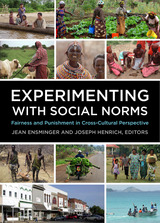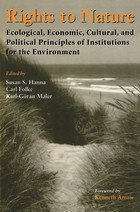

Property rights are a tool humans use in regulating their use of natural resources. Understanding how rights to resources are assigned and how they are controlled is critical to designing and implementing effective strategies for environmental management and conservation.
Rights to Nature is a nontechnical, interdisciplinary introduction to the systems of rights, rules, and responsibilities that guide and control human use of the environment. Following a brief overview of the relationship between property rights and the natural environment, chapters consider:
- ecological systems and how they function
- the effects of culture, values, and social organization on the use of natural resources
- the design and development of property rights regimes and the costs of their operation
- cultural factors that affect the design and implementation of property rights systems
- coordination across geographic and jurisdictional boundaries
READERS
Browse our collection.
PUBLISHERS
See BiblioVault's publisher services.
STUDENT SERVICES
Files for college accessibility offices.
UChicago Accessibility Resources
home | accessibility | search | about | contact us
BiblioVault ® 2001 - 2024
The University of Chicago Press









